Rightful Heir
Worf accidentally conjures up a Klingon Messiah while on vacation - I'm sure we've all had this experience at one time or another!
Riker has to break into Worf’s quarters because our Klingon Security Chief is late for work - and he’s never late for work! Turns out he’s been eating special Klingon cookies or whatever it is that they do to get into deep trances. Save it for the weekend, Worf! After the opening credits, Worf links up this week’s story to “Birthright”. To punish Worf for his poor behaviour, the Captain gives Worf extra holiday time so he can take part in a Klingon sweat lodge. While there, he accidentally summons up Kahless, the Klingon Messiah. Happens all the time, I’m sure! But the return of the first Emperor of the Klingons throws the entire political regime of the Klingons into disorder. Is this the real Kahless (well obviously not - it turns out to be a clone)? But real or not, what does the apparent return of their ancient hero mean for Klingon society...?
Words
This episode had the greatest pitch name ever: “Jurassic Worf”. James E. Brooks pitched an idea concerning intrigue among the Klingon clerics, and did not use Kahless as such. I don’t know much about Brooks... in fact, nobody seems to. He has no other writing credits in any media that I can find. This story being about Klingon culture, it inevitably was snapped up by Ronald D. Moore. But Moore wanted to take it all in a different direction.
I thought it was a real nifty idea and I thought it was an opportunity to do a show unlike others we've done. The subject wasn’t something that we tackled, so I was eager to do it. I wanted to do something interesting. I’m very proud of the script. It deals with faith and belief that we don't normally deal with on Star Trek.
Indeed, as Jeri Taylor remembered, this episode kicked off very lively discussions among the writing staff concerning their views of faith and its role in the world of Star Trek: The Next Generation:
Gene Roddenberry was very much a secular humanist, and I don’t think that story would have worked with anyone else but Worf.
Indeed! The Klingons provided a back door to let something that had been excluded from ever being seen in this universe, and there’s something quite wonderful about this. Moore, incredibly well versed in classic Star Trek, knew about Kahless from “The Savage Curtain”. There, he’d been seen as a cunning but barbarically violent. Moore has never commented on this, but the conventional way of plugging the hole in the canon is that that Kahless was conjured up from Kirk’s mind, and therefore was rendered in an obviously prejudicial form. Here’s Kahless the Unforgettable with Colonel Green, who sounds less like a despotic dictator and more like he escaped from the Cluedo board:
In fact, much of the lore that Moore injects here was written for “Birthright, Part II”, and ended up being cut from that episode for length. (Ironic, really, considering that one spilled out into a two-parter and had to be padded out with a Data story!) Reading between the lines, Rick Berman had wanted to remove those elements from that earlier episode, and wrestled with Moore when it was brought back here:
I had a lot of fights with Ron about this. The character of Kahless and the backstory and the dialogue of Kahless were all a little bit too on the nose Christ-like for me. We had a lot of long debates and eventually it was modified by Ron in a way that I think made it much better. I think he not only solved my problems but made the screenplay better.
There was plenty cut from this one, including the idea that the Kahless clone was a plot by the Duras sisters, and a few lines covering the absence of Alexander (who would be spectacularly out of place in this story). One of the more interesting cut scenes involved Kahless’ arrival on the Enterprise, where he greets Picard as a worthy warrior and presumes that Deanna Troi is intended as a ‘gift’ for him! Nice to know that some of the abuses the production team piles onto Marina Sirtis do end up getting cut.
Delivering on the screenplay’s ambitions fell to director Winrich Kolbe, pictured here with Michael Dorn and a gaggle of Klingons.
The toughest part was the sweat lodge:
It was a difficult show to do. It started out rather conventionally, but once we got on Stage 16, we spent three days there. It was totally smoked in, in order to get that haze…I’m still coughing. The special effects people kept telling us it’s non-poisonous and just a slight irritant. Well, I had a very heavy allergy which I think was caused by the smoke, but the show just looks terrific. It looks like a movie.
Michael Dorn was happy with Moore's screenplay, and how ‘Rick’ (director Winrich Kolbe) brought it to life:
It was a well-written script. Usually you get ten different colours or changes, but in “Rightful Heir” maybe there were two minuscule changes. Rick and I had mini-discussions about where the character should be. He’s wonderful and I trust him – so if he says, “Michael, try it like this”, you go, “Okay” and you trust him.
It is worth mentioning that this is the first time that Sto-Vo-Kor, the Klingon afterlife, is mentioned by name. DS9 will go on to play with this idea extensively, and I think it’s interesting that this is the only Klingon name or phrase not given a pronunciation in the guide at the head of the screenplay (presumably because it's spoken as its written).
Brannon Braga was a fan of this episode:
It’s a show which has some powerful metaphors for modern day religious beliefs. Star Trek has never tackled religion with such vigour as in this episode. The man playing Kahless as the Jesus Christ of the Klingon Empire was great and Michael Dorn’s performance is powerful. It has the potential to be a very controversial episode that will take Worf’s character in some interesting new directions.
I agree. And when Worf is later grafted into DS9, this episode’s lore-dump is one of the key references that the writing team of that show build upon.
Acting Roles
This is a Mindwarp for Worf, to be sure, as he goes from doubt, to faith, to anger at the deception behind the Kahless clone. Michael Dorn gives a fine performance here, and according to the director this was helped by Dorn having learned to stick up for himself far more than when he joined the show:
Michael and I have an interesting relationship. I try to push him and sometimes I push too hard and he will fight back. Michael has matured since I met him four or five years ago. He has become a lot more secure and has become a lot better. That obviously helped on this particular show. He knew it was his show and we went in there from the beginning saying that we're going to make this the best show of the season.
Okay, they didn't achieve that, but it’s still an interesting contribution to season six’s recurring theme.
The episode hinges less on Dorn’s performance, however, than on Kevin Conway as Kahless, which Rick Berman was especially pleased with.
Conway’s career has been eclectic, but you might have seen him in roles in Gettysburg, Mercury Rising, Thirteen Days, and Invincible.
Alan Oppenheimer plays Koroth, the mastermind behind the Kahless clone plot.
It would have been easy to render this character a straightforward villain, but I’m pleased that there is more texture to this character, and I like his performance here very much. Much more expressive than many Klingons we get!
They get him back in both DS9 and Voyager, in different roles. Oppenheimer’s career started on TV in 1963, on the TV version of The Untouchables, and he racked up nearly 350 roles over his long and distinguished career! He played the Chief Supervisor in the 1973 film adaptation of Westworld, and a rabbi in Private Benjamin, but the vast majority of his roles have been in voice overs for cartoons or videogames. In 1984, he provided the voices the Rockbiter, the luck dragon Falkor, and the sinister G'mork in the English version of The NeverEnding Story, but all this fades into significance next to his greatest ever contribution to culture is as the voice of Skeltor, Man-at-Arms, and Battlecat in 130 episodes of He-Man and the Masters of the Universe!
This episode also sees the return of Robert O’Reilly as Gowron!
It's actually his last appearance in TNG, but of course, the legend of those incredible eye sockets lives on in DS9!
Models, Make-up, and Mattes
It’s a show heavy on the talking, but there are two contributions by the SFX team worth mentioning (beyond the return of the Klingon Attack Cruiser in rather familiar stock footage). Firstly, there’s the Throne of Kahless, which was specially constructed for this episode and features a new variant on the Klingon emblem (a red claw upon a gold field). Here’s Oscar-winning make-up artist Doug Drexler sitting atop the throne!
Apparently, Drexler's Academy Award (for Dick Tracy, which he worked on before joining TNG), was a source of great amusement and pride for the TNG crew! As he later recalled:
The cast loved it. They went crazy. LeVar Burton used to tease me constantly. I would walk on set, he would yell, “ladies and gentlemen, Academy Award winning makeup artist Doug Drexler!” It didn’t matter where I was. One day I was walking down Ventura Boulevard in Studio City, and some guy comes racing around the corner and we collide. We looked at one another, and it’s LeVar! I’m like, “oh, no”, because I knew it was coming. He turns to the entire crowded street and announces at the top of his lungs, “ladies and gentlemen, Academy Award winning…”. Funny as hell!
Lastly, we get a matte painting for the Boreth monastery, created by Dan Curry, which appears in two variations:
It was inspired by similar buildings that Curry had seen in the Himalayas - here he is holding an inspirational painting.
This matte painting is, in my view, shot too close in. They needed to create a much bigger painting that they actually used. While it looked fine on a 90s TV, the problem becomes acute on the dreadful high resolution televisions we now have to put up with. Still, a matte painting is a matte painting, and I’m not going to complain about getting one!
All in all, this is a thoughtful, engaging episode, heavy on the politics and philosophy and light on action. Worf does get to fight, but I'm hesitant to call this a win for him since Kahless stops the fight to pontificate. He’s currently batting 3-3 this season, his lowest number of fights since season 1 (five total) and 2 (just three!). If he can just get one more win in the remaining three episodes, he’ll finish with another winning season like season five. Can he do it? I look forward to finding out.


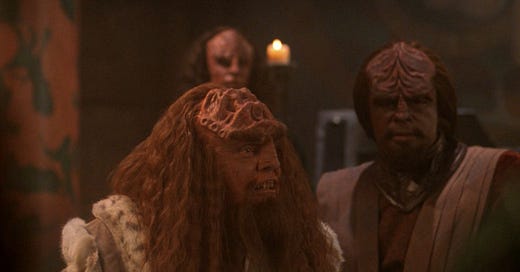



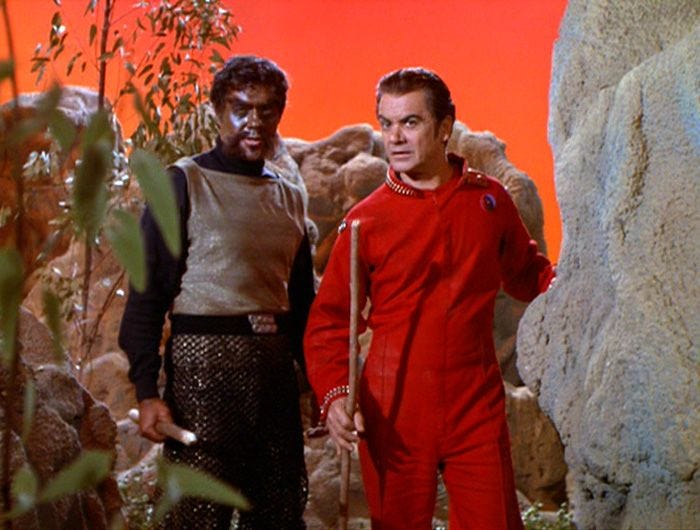
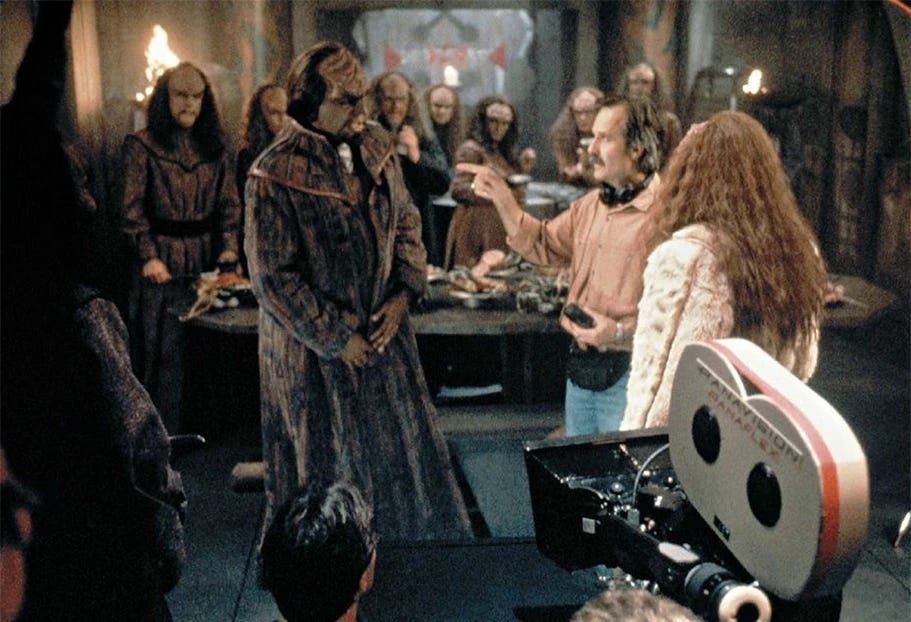
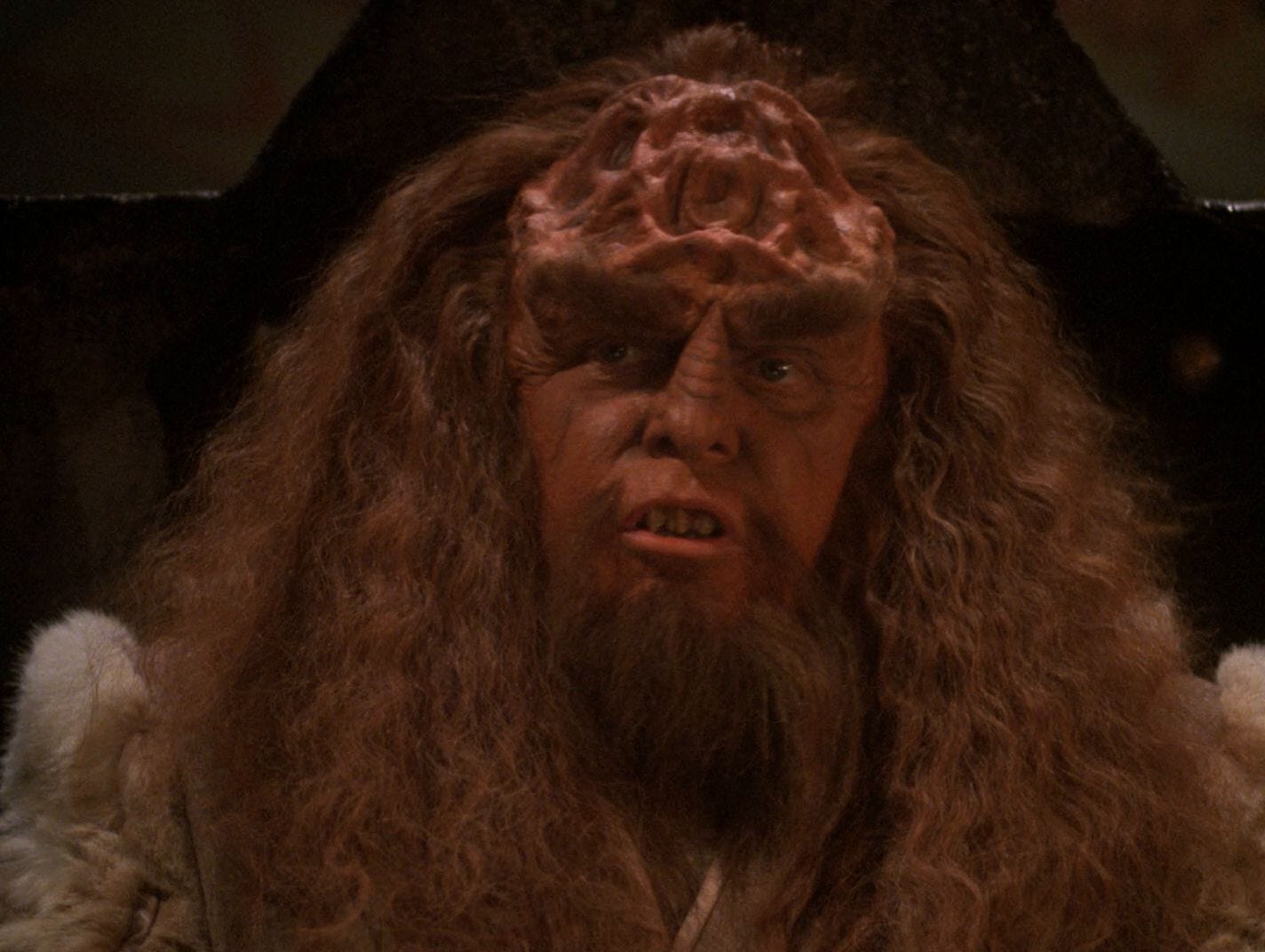
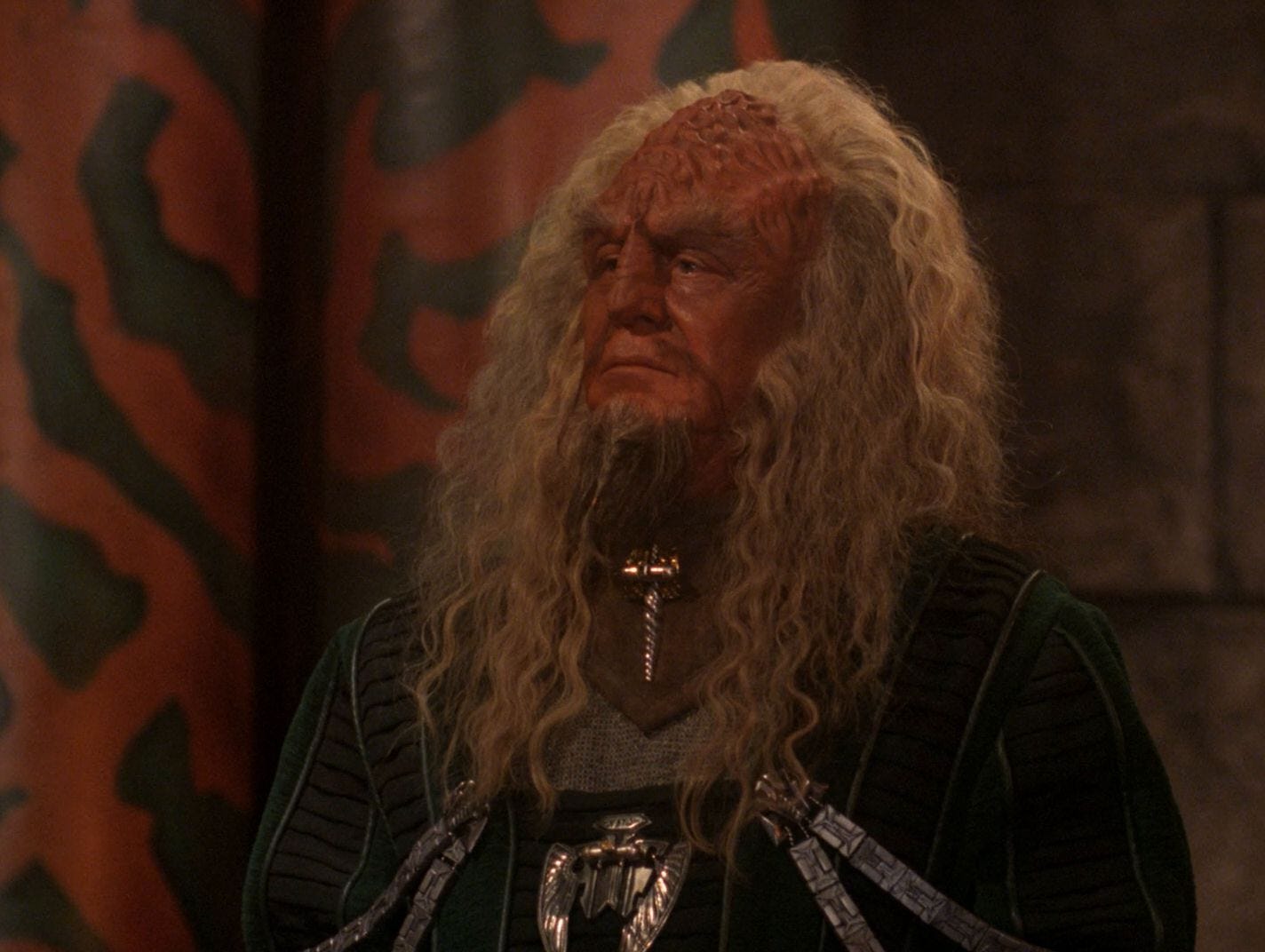
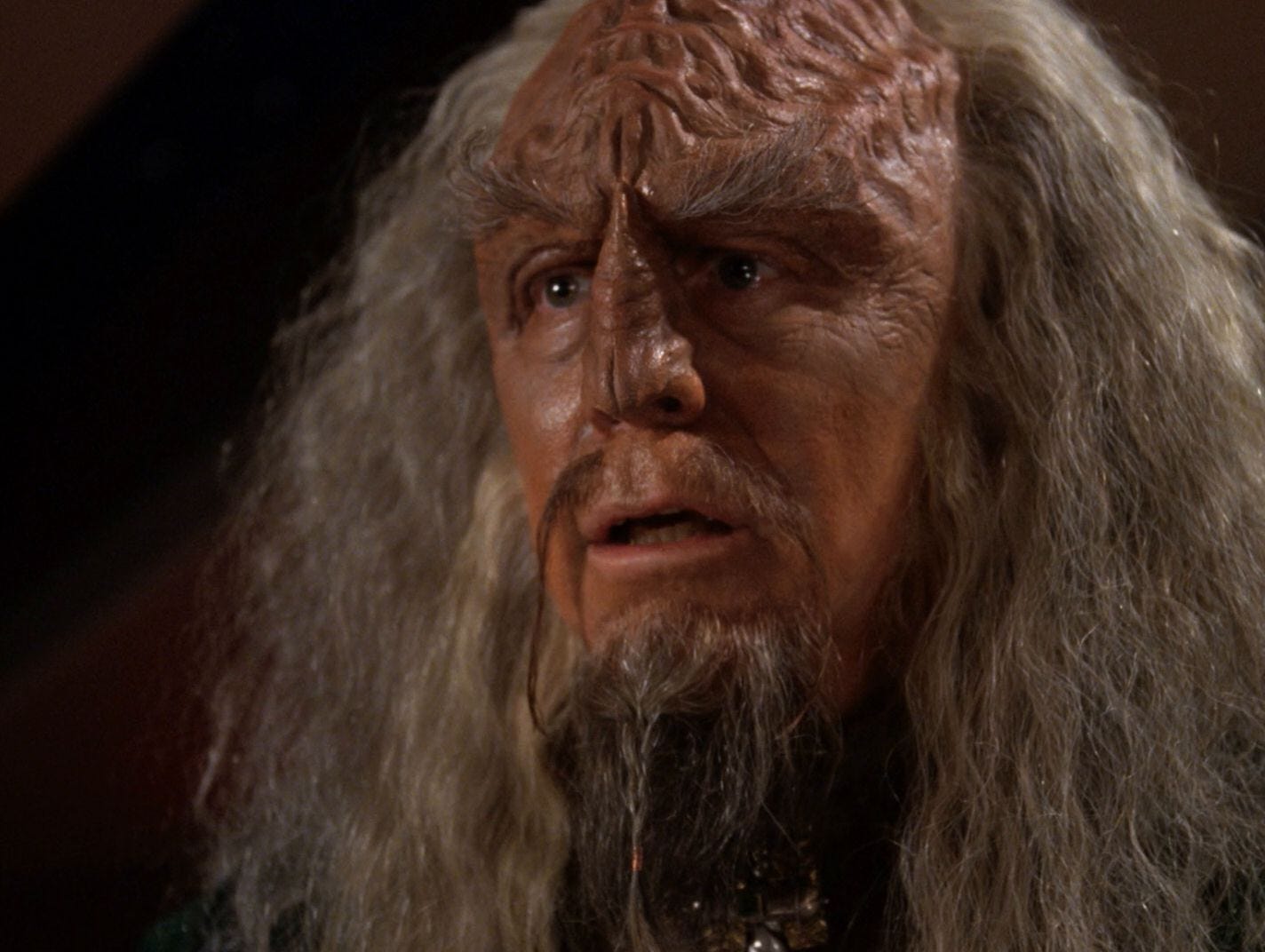
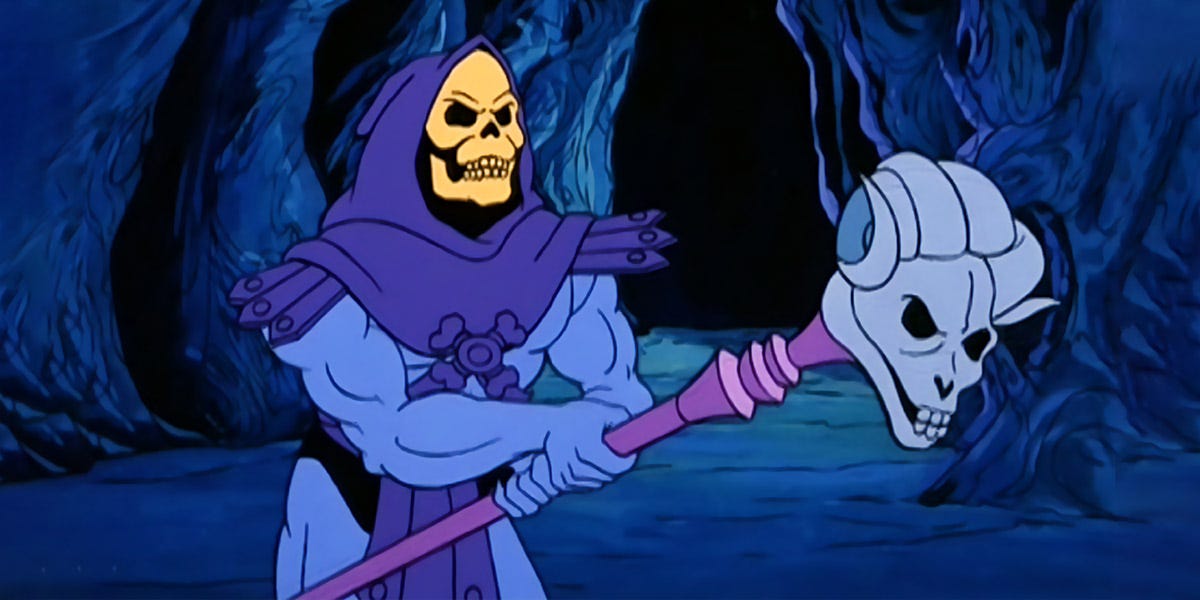

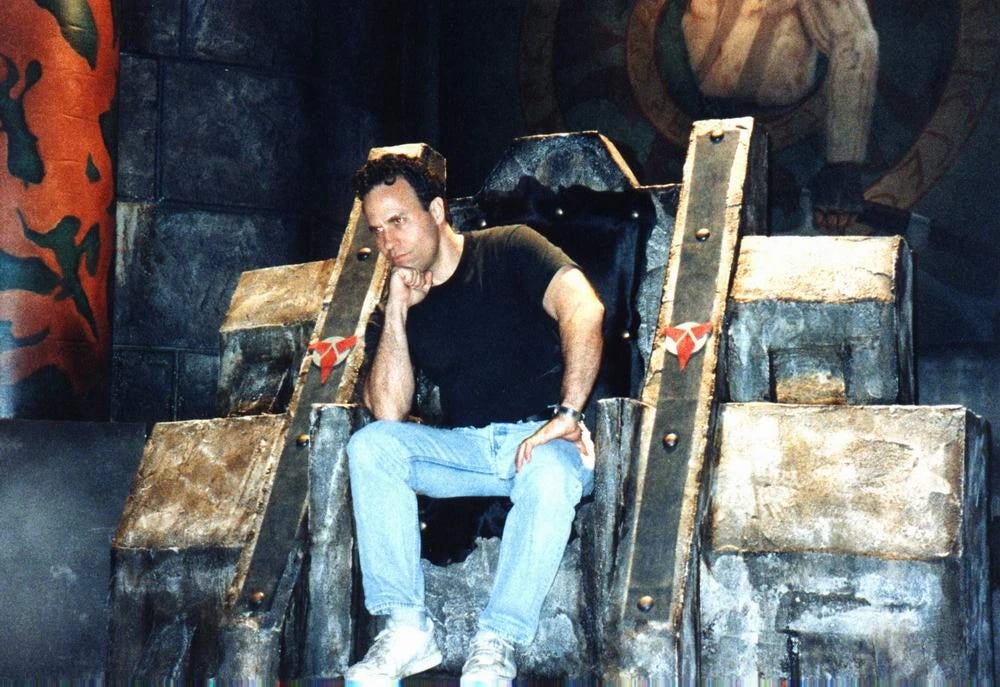


Kahless (the Clone) is a major player in the current Star Trek comic book; causing all kinds of trouble across the galaxy and shoving a returned-from-the-Celestial-Temple Captain Sisko into a hero's quest. It's a great series, set between Voyager's finale and Nemesis, so you've got all sorts of folks turning up and playing roles. I love it, highly recommend.